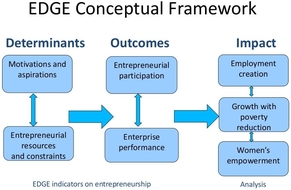![]() Methodology
Methodology
Measuring entrepreneurship from a gender perspective
Existing research finds that gender is relevant to the:
- determinants of entrepreneurship - Women are less likely than men to start an enterprise and more likely to be motivated by “push” factors, such as poverty, divorce, unemployment or dissatisfaction with their current employment, to start an enterprise;
- characteristics of enterprises - Women’s enterprises tend to be smaller, to operate with less capital, and to be more embedded in the family structure than men’s enterprises;
- performance of enterprises - Evidence on gaps in sales and profits between female and male-owned firms suggests that many women entrepreneurs are not yet able to fulfil their productive and innovative potential. However, traditional performance measures, such as growth and profits, are not always the top priority for women entrepreneurs because they may have other objectives than profit maximization when starting enterprises, such as greater flexibility to balance work and family.
Measuring entrepreneurship from a gender perspective can provide a better understanding of how women contribute to the economy and of how to foster women’s entrepreneurial activity.
The EDGE initiated the development of the conceptual framework on measuring entrepreneurship from a gender perspective and tested the methodology in six countries during the period from 2014 to 2016. The lessons learned from the six pilots, namely, Georgia, Maldives, Mongolia, Philippines, South Africa, and Uganda, are presented in the EDGE Technical Report on Entrepreneurship.




